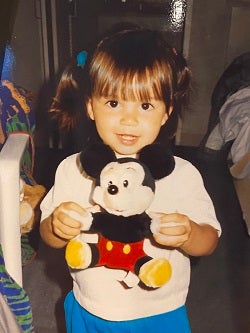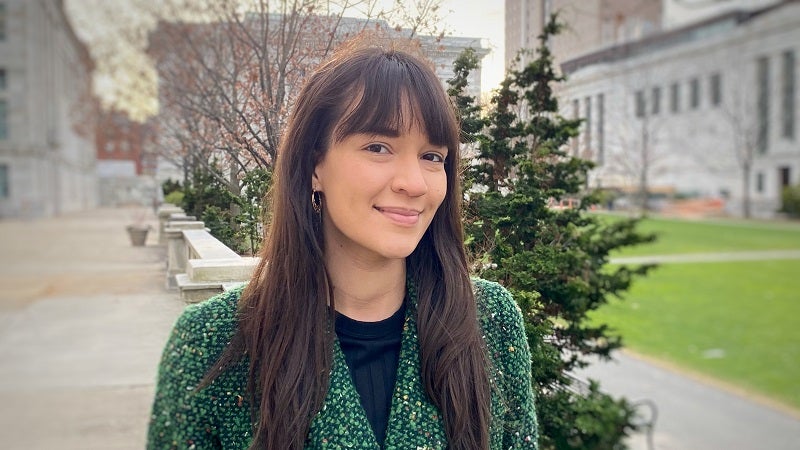Serotonin and dopamine are widely known for their role in mood regulation, but these neurotransmitter systems also affect behaviors like learning and memory and homeostatic body processes like breathing and respiration. I study a subtype of serotonin-producing neuron that expresses a receptor for dopamine. This neuron subtype is involved in social and defensive behavior, and all evidence points to this being the only subtype of serotonin neuron to express any dopamine receptor in the mature mouse brain. Therefore, we think it’s an important link between the two neurotransmitter systems. My research has focused on what the purpose of this dopamine receptor is in relationship to behavior. I have found sex-specific changes in behavior when we delete this receptor from serotonin neurons, as well as sex differences in these neurons at the molecular, cellular, and circuit level.
What career did you aspire to as a child?
I wanted to be a ballet dancer, a veterinarian, a film maker, or a museum curator! My parents are both veterinarians, so my brother and I grew up playing on the floor in the office of my mom’s veterinary clinic, traveling to conferences with her, and hearing the details of her patients’ cases at the dinner table. My mom was, and still is, such a passionate and devoted veterinarian. I admired this so much in her—but it also could be frustrating to me as I grew up because I struggled to find something that I felt that way about. I wanted to do something that helped others but was also creative.

Childhood photo of Krissy, playing with her first mouse
In college, I started as a psychology major. I was taking psychology courses and was really struck by statements like, ‘The prefrontal cortex controls decision making.’ I wanted to understand what that really meant. How did cells in a part of your body control something like that? This led me to cellular and molecular biology and neuroscience. Initially, I wasn’t at all interested in biology because I (wrongly) thought science was rote memorization and strict rules for how things had to be done. Luckily, I had a great professor who wove the trial and error and problem-solving creativity of designing experiments into everything we learned. I realized neuroscience could satisfy those requirements of being creative and helping others.
What is the hardest part about the work you do?
The hardest part is knowing when to stick with something and keep trying or when to call it quits. Prior to being a scientist, one of the most challenging things I did was dance. In ballet or modern dance, I always felt like I could get the choreography or the technique as long as I kept trying and practicing. Perhaps it had to do with my age at the time, but I felt my ability was limitless. In science, there are experiments that you can keep trying, repeating, and tweaking and they just won’t work – at least not with the tools and methods currently available. The hardest part of my graduate work has been knowing when to stop and put my efforts somewhere else. There are experiments I let go on for too long and experiments I regret not continuing. I hope as I progress through my scientific career, I will get better at this.
What are some of your interests outside the lab?
I love food and cooking. For me, this is really tied to my family and what we like to do together. For holidays, my mom, brother and I usually spend all day cooking a huge meal. This started when we were pretty young. My brother and I would come up with these elaborate plans, ‘Okay Mom, we are doing an Italian menu for Christmas dinner but we need to go buy a potato ricer so we can make the gnocchi by hand’, and she was very encouraging. Now, I enjoy it because it is (mostly) something that will always work. You can make a mistake but it’s still fun and usually edible.
What do you feel most passionately about?
I am so passionate about education for girls and women. My family strongly promoted education for me, but I grew up in an area where it was definitely not a given for girls to go to college the way it was for a lot of boys. I remember telling friends’ parents I was leaving to go to college in Portland, Oregon and some asked what the point of me going to college was. They were even more perplexed when I saw them years later and mentioned I was getting a PhD. I had friends who were really smart and motivated, but the support wasn’t there for them to pursue their intellectual curiosities or academic dreams. At the very least, I hope I can be a mentor and part of a support system for women who have similar experiences. My dream would be to get involved with or start programs for high school students or undergrads who want to get into science, or go on to higher education in any field, but don’t have the support – emotionally or financially – to do so.
What are your hopes for the future?
I just defended last month and am starting my postdoc in Nicola Allen’s lab at the Salk Institute in San Diego soon. I’m excited to start a new project and take everything I learned in grad school and hopefully do some really cool, impactful new science. In Boston, I’ve hiked a lot in the winter and tried to learn to love the snow. So in San Diego, I’m excited about finding a new hobby. I don’t think surfing will be for me, but I’ll be looking for something near the beach – maybe boardwalk rollerskating!
Read Krissy’s HBI Community Story “Exploring How Serotonin and Dopamine Interact“.

